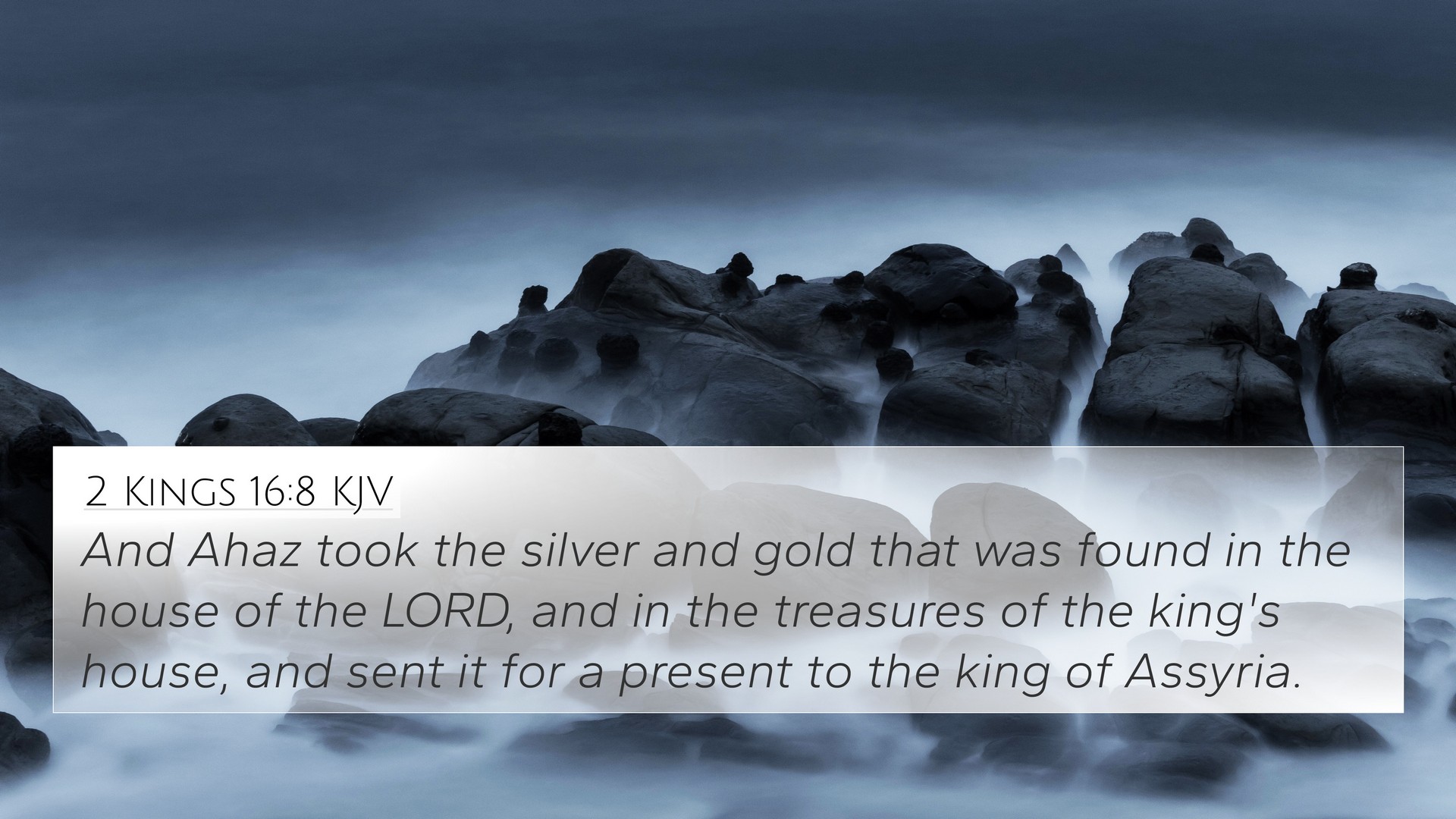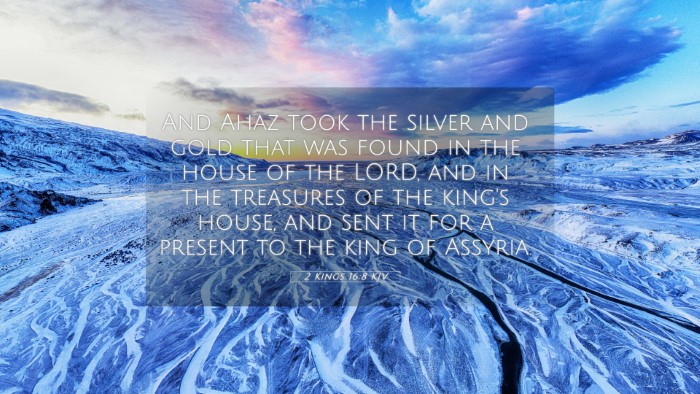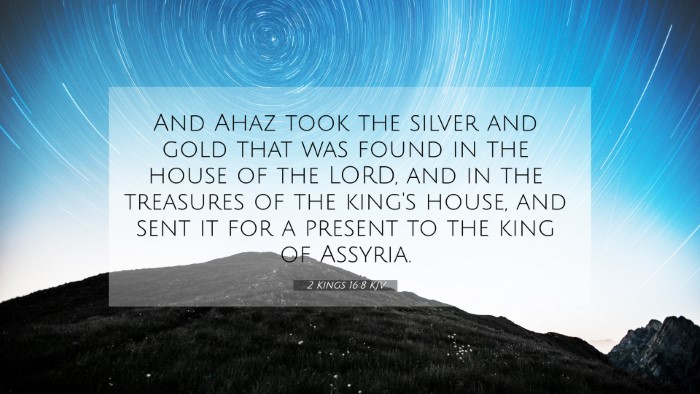Old Testament
Genesis Exodus Leviticus Numbers Deuteronomy Joshua Judges Ruth 1 Samuel 2 Samuel 1 Kings 2 Kings 1 Chronicles 2 Chronicles Ezra Nehemiah Esther Job Psalms Proverbs Ecclesiastes Song of Solomon Isaiah Jeremiah Lamentations Ezekiel Daniel Hosea Joel Amos Obadiah Jonah Micah Nahum Habakkuk Zephaniah Haggai Zechariah Malachi2 Kings 16:8 Similar Verses
2 Kings 16:8 Cross References
And Ahaz took the silver and gold that was found in the house of the LORD, and in the treasures of the king's house, and sent it for a present to the king of Assyria.
Uncover the Rich Themes and Topics of This Bible Verse
Listed below are the Bible themes associated with 2 Kings 16:8. We invite you to explore each theme to gain deeper insights into the Scriptures.
2 Kings 16:8 Cross Reference Verses
This section features a detailed cross-reference designed to enrich your understanding of the Scriptures. Below, you will find carefully selected verses that echo the themes and teachings related to 2 Kings 16:8 KJV. Click on any image to explore detailed analyses of related Bible verses and uncover deeper theological insights.

2 Kings 12:17 (KJV) »
Then Hazael king of Syria went up, and fought against Gath, and took it: and Hazael set his face to go up to Jerusalem.
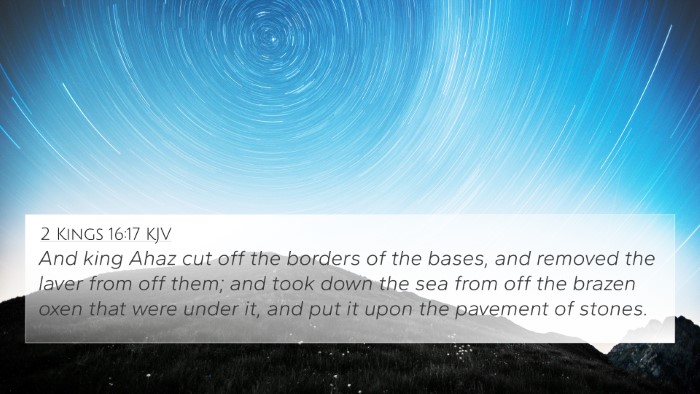
2 Kings 16:17 (KJV) »
And king Ahaz cut off the borders of the bases, and removed the laver from off them; and took down the sea from off the brazen oxen that were under it, and put it upon the pavement of stones.

2 Kings 18:15 (KJV) »
And Hezekiah gave him all the silver that was found in the house of the LORD, and in the treasures of the king's house.
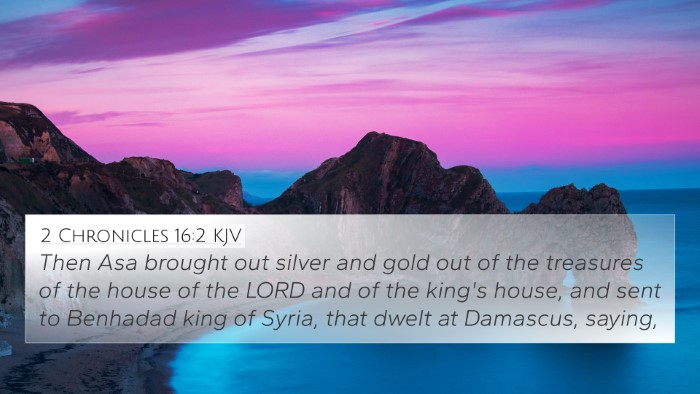
2 Chronicles 16:2 (KJV) »
Then Asa brought out silver and gold out of the treasures of the house of the LORD and of the king's house, and sent to Benhadad king of Syria, that dwelt at Damascus, saying,

2 Chronicles 28:20 (KJV) »
And Tilgathpilneser king of Assyria came unto him, and distressed him, but strengthened him not.

Isaiah 8:7 (KJV) »
Now therefore, behold, the Lord bringeth up upon them the waters of the river, strong and many, even the king of Assyria, and all his glory: and he shall come up over all his channels, and go over all his banks:
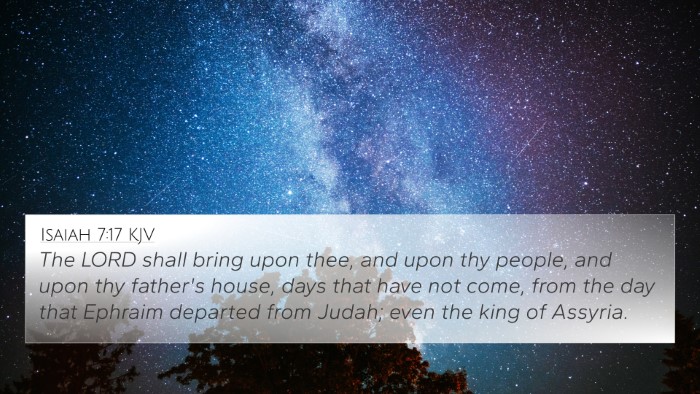
Isaiah 7:17 (KJV) »
The LORD shall bring upon thee, and upon thy people, and upon thy father's house, days that have not come, from the day that Ephraim departed from Judah; even the king of Assyria.
2 Kings 16:8 Verse Analysis and Similar Verses
Understanding 2 Kings 16:8
2 Kings 16:8 states, "And Ahaz took the silver and gold that was found in the house of the Lord, and in the treasures of the king's house, and sent it for a present to the king of Assyria." This verse highlights the actions of King Ahaz, who sought help from the king of Assyria during a time of crisis.
Summary of Insights from Commentaries
-
Matthew Henry's Commentary
Matthew Henry explains that Ahaz, facing threats from Israel and Syria, chose to rely on a foreign power instead of seeking help from God. His decision to strip the treasures from the temple signifies a lack of faith and highlights the spiritual decline in Judah. Henry emphasizes that this act shows a dangerous precedent of prioritizing earthly alliances over divine reliance.
-
Albert Barnes' Notes
Barnes elaborates that Ahaz’s action to send wealth, which belonged to God, indicates a severe compromise of faith. Instead of turning to God for deliverance, Ahaz sought a political alliance, demonstrating a lack of understanding regarding God's sovereignty and power. Barnes also highlights the idea that this reliance on Assyria would bring long-term consequences for Judah.
-
Adam Clarke's Commentary
Clarke points out the desperation of Ahaz in trying to secure Assyrian aid. He underlines that Ahaz not only gave away the treasures but also compromised the worship and integrity of the temple. Clarke stresses the importance of looking for spiritual solutions rather than succumbing to materialistic or political pressures.
Thematic Connections to Other Bible Verses
This verse can be related to several other scriptures that echo the themes of reliance on foreign nations instead of God, the consequences of disobedience, and the importance of faith. Here are some critical cross-references:
- Isaiah 7:1-2 - Discusses the conflict with Israel and Syria and God's promise of protection.
- 2 Chronicles 28:20 - Relates to Ahaz's transactions with Assyria, emphasizing the repercussions of his decision.
- Psalm 20:7 - "Some trust in chariots and some in horses, but we trust in the name of the Lord our God," highlights the folly of trusting in earthly powers.
- Jeremiah 17:5 - Warns about the consequences of relying on humanity rather than God.
- Micah 5:5 - Prophecies of hope and restoration contrasting Ahaz’s reliance on Assyria.
- 1 Kings 15:18 - Shows a historical precedent of kings stripping the temple for foreign alliances.
- Hebrews 13:5-6 - Encourages believers to rely on God for help and not turn to the world for security.
Application of the Verse for Today
The lessons from 2 Kings 16:8 continue to resonate with modern readers. We are often tempted to rely on worldly means for security, forgetting that true power and help come from God. Just as Ahaz’s actions illustrated a departure from divine faithfulness, we too can fall into the trap of prioritizing material support over spiritual integrity.
Tools for Bible Cross-Referencing
For those looking to delve deeper into the biblical texts and understand the connections between verses, several tools can assist:
- Utilizing a Bible concordance can help find relevant scriptures related to themes and key terms.
- Engaging in a cross-reference Bible study can provide a broad understanding of how verses interact with each other.
- Resources like a Bible cross-reference guide allow for thematic explorations of Scripture.
- Employing a comprehensive Bible cross-reference system can enhance personal study sessions.
- Investing time in learning cross-referencing Bible study methods will enrich one’s understanding of the connections between passages.
Conclusion
2 Kings 16:8 serves as a profound reminder of the need for faithfulness and reliance on God. The insights from public domain commentaries encourage readers to examine their own sources of trust and highlight the importance of seeking divine guidance over worldly assurances. Through careful study and cross-referencing, one can uncover the interconnectedness of the Bible and deepen their understanding of God's word.
